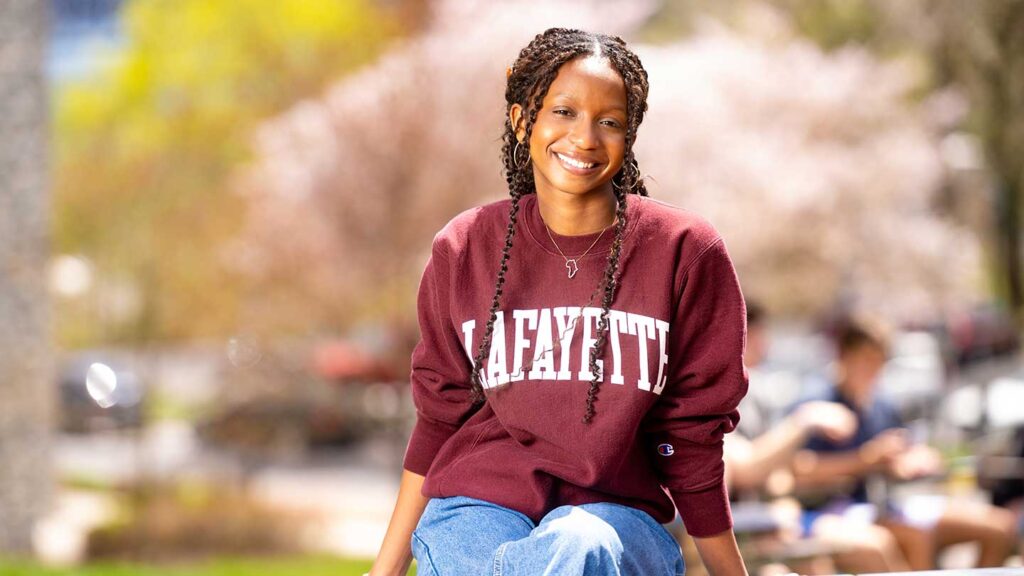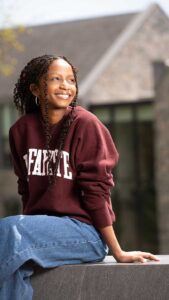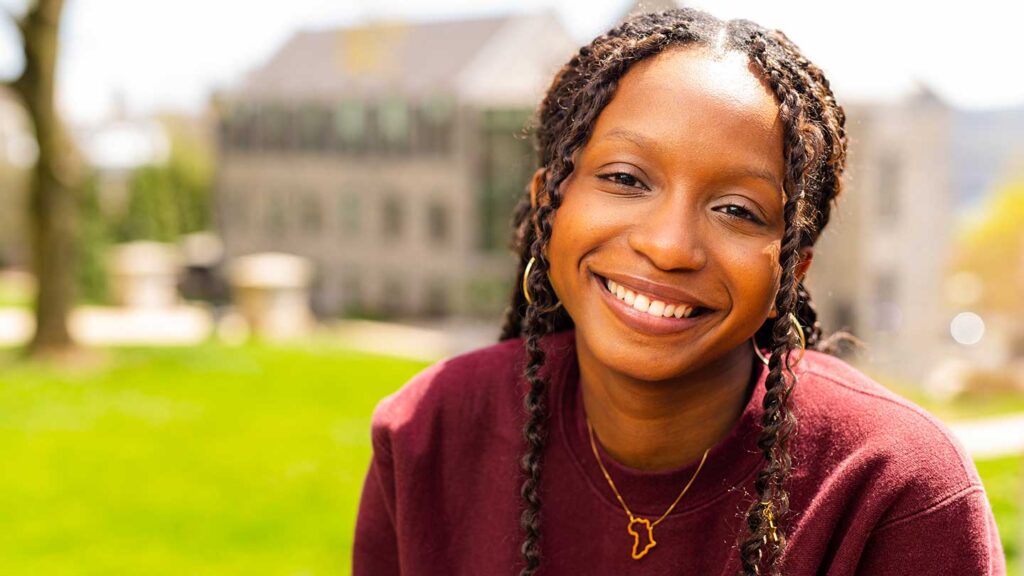Finding her ‘why’ by asking ‘why not?’
 By Stella Katsipoutis-Varkanis
By Stella Katsipoutis-Varkanis
Looking back on her days as a child growing up in Guinea, West Africa, Mariama Bah ’24 recalls the ideal that served as the foundational pillar of her family: education.
“For my parents, getting a high school diploma is not enough,” Bah says. “When you get a college degree, master’s, and Ph.D., that’s when you’ve made it. Their dream was to come to the United States, work hard, and take advantage of the opportunities here. That shaped how I saw my own educational journey.”
It was in pursuit of her parents’ version of the “American dream” that led Bah to study in the United States. Now, as she discovers her passions as a first-generation student at Lafayette with a double major in engineering studies and international affairs, Bah is redefining what the term means to her.
“When I was a child, I watched my mother making dishes to share with people around the village and opening our doors to others during Ramadan. I looked on as my father helped build a well to bring water to those who didn’t have access to it. That community service I experienced growing up also became an innate part of who I am,” Bah says. “So, while that thirst for knowledge and that value in the pursuit of learning is still very much present in my American dream, my core focus is serving marginalized groups by addressing issues that impact them, like sustainability.”
When she began her search for a college in the U.S., Bah knew she was interested in various subjects across the sciences and humanities. She was unsure, however, if she would find an institution or course of study that would blend what she thought were opposing passions—in a way that would also set her on a path to pursue community-centered work. Until she found Lafayette.
“I was immediately sold on Lafayette’s ‘Cur Non’ dream,” she says. “I was looking for a way to bring together all my different interests and make them work together—and I knew that if ‘Why not?’ was its motto, Lafayette was where I could make that happen.”
 As a first-year student, Bah dipped her toes in a variety of potential majors in an effort to find the one (or ones) that would materialize her vision. It was when she began having conversations with professors across departments and disciplines that she found her niche as a double major in engineering studies and international affairs.
As a first-year student, Bah dipped her toes in a variety of potential majors in an effort to find the one (or ones) that would materialize her vision. It was when she began having conversations with professors across departments and disciplines that she found her niche as a double major in engineering studies and international affairs.
“I really love these majors, and if you were to ask high school me if this was a possibility, I would say that this is exactly where I wanted to be—I just didn’t know how to put it into words,” Bah says. “Hannah Stewart-Gambino, [professor of government and law and international affairs], introduced me to the engineering studies major during a conversation I had with her about wanting to do people-centered work, and it changed my trajectory. Engineering studies is very interdisciplinary—so we’re not just talking about science and technology, we’re talking about the human and social impacts they have. And with international affairs, I can see how these impacts affect people globally, and I can apply what I learn to community and international development.”
Bah, who aims to earn a master’s in community climate adaptation at Worcester Polytechnic Institute after graduating from Lafayette, complements her undergraduate studies with an array of co-curricular activities outside of the classroom, where she can put her knowledge and passion for service into practice. She has served on the board of the Lafayette chapter of Girl Up, an international organization that provides youth with the training, tools, and community to build their leadership skills and accelerate social change. She’s participated in campus-wide initiatives like Green Move Out (an effort where students recycle their unused or gently used household items by donating them to local organizations and the College’s community sale) and Pard Pantry (which is dedicated to providing nonperishable food items and personal hygiene products to Lafayette students). She’s also currently working on revitalizing the Best Society, an academic society for engineering studies students. Plus, she was recently appointed as the equity and inclusion officer of Lafayette’s Student Government.
Bah hopes to someday work for the United States Agency for International Development (USAID) or another community development-focused organization, focusing on issues like sustainability and land rights. She believes global, sustainable, and long-lasting change begins at the local level, thus her overarching goal is to work on development projects to enact local changes that are for the greater good and are self-sufficient, so her work can live on through future generations. And as a rising senior at Lafayette, she’s already achieved a great deal in the way of carving out a path to that career destination.
Currently, Bah is spending the summer studying Portuguese in Brazil as a Boren Fellow—a prestigious scholarship opportunity she was awarded in the spring. She’s also making the most of her time in Brazil by simultaneously conducting research on the definition of land rights and how communities can be empowered to secure those land rights—a research project she’s working on in partnership with Rexford Ahene, professor emeritus of economics at Lafayette. The project was made possible by Gladstone “Fluney” Hutchinson, associate professor of economics at Lafayette and Whitman Family Director of the Gladstone Whitman ’49 Endowment Funds.
“I always wanted to visit Latin America, and it’s also my region of focus in my international affairs major,” Bah says. “I also speak French and Spanish, so learning Portuguese was the next logical step. At the same time, the Boren opportunity provided the perfect gateway to work on my project with Prof. Ahene. I am investigating how Indigenous and local communities in Salvador Bahia manage their land and natural resources. The main question I am asking in my research is: How can we contend with the traditional communal framework of land rights and the modern legal system, which often do not recognize the traditional way? I am talking with people from Rio and communities in Bahia, creating connections and building a network that will inform my research project.”
An alumna of the Stevens Initiative virtual exchange program—which, in summer 2022, gave her the opportunity to discuss global issues and build cross-cultural ties with students in the Middle East and North Africa over Zoom—Bah also was named a Stevens Initiative Alumni Fellow in early 2023. The fellowship provides 24 students from eight countries in the Middle East and North Africa, as well as seven U.S. states, an opportunity to form meaningful relationships with one another while fostering global learning, professional development, and leadership exploration. Through the yearlong fellowship, Bah is participating in monthly virtual exchange sessions, which culminate in the implementation of a collaborative community project; an in-person workshop in Amman, Jordan; a visit to her exchange partner’s home country of Morocco; the opportunity to host her exchange partner in the U.S.; and a summit in Washington, D.C.
“It’s the most amazing experience ever,” Bah says. “It’s really focused on building multicultural competency and communication, helping people from different cultures understand each other and work together on issues that they care about, but look different in their respective regions. I was paired with a student in Morocco who also is passionate about sustainability, and we’re working together on a project we’ll be implementing in the fall, which focuses on building grassroots and sustainability leaders among young people around the world.”
Bah is also passionate about informing her fellow Lafayette students about the virtual exchange program, as it could provide students who may not be able to study abroad the chance to gain virtual exposure to different cultures and countries across the world.
The experiences she’s gaining through the Boren Fellowship and the Stevens Initiative, Bah says, are helping her develop a unique perspective that will serve her well in her future, no matter what career path she ultimately decides to follow.
“When I go into the workforce, I won’t have just a one-dimensional understanding of sustainability, land rights, or any other development issue; I’ll be able to explore how someone in a different country would look at those issues, and I can reach out to the global connections I’ve established to talk to them and ask questions.”
Bah shares that she is grateful for the support she’s received from faculty and staff across the Lafayette campus, which has been instrumental in her forging of her own destiny.
“Julia Goldberg, [associate dean of advising and co-curricular programs], helped me discover the Boren opportunity and encouraged me to apply for it, even though I wasn’t sure if I was going to get it,” Bah says. “So, I did it, and it was a huge personal accomplishment. Goldberg solidified the idea of going for something despite not knowing if it’s going to work out or not. Prof. Ahene challenges me to question why I’m doing things that I’m doing. In every conversation I have with him, he says, ‘What’s the why? That’s the thing you don’t want to lose.’ Prof. Hutchinson has been very supportive of my research as well. Also, I did not have a strong math background transitioning to high school in the U.S. But everyone in Lafayette’s Math Department has been so helpful that I’ll be graduating with my top sequences—another ‘Cur Non’ moment for me.”
She says she’s thankful that Lafayette allowed her to be and express every version of herself as she moved through the various stages of her academic journey. “Freshman year me is totally different from who I am at the moment, and it’s great that I was able to be that person then and this person now. Lafayette was an avenue for self-discovery for me.”
Before her upcoming graduation from Lafayette in spring 2024, Bah hopes to share this message with both current and prospective Lafayette students: Find your “why” by asking yourself, “Why not?”
“Talk to people. Go to people in different areas and departments, and tell them about the things you’re interested in, the visions and ideas you have. Read and inform yourself about what’s going on in the world. Talk to yourself and self-reflect. You’re going to leave an impact on society, no matter what career you follow. Digging deeper into the ‘why’ that you’re doing things will shape the type of work that you do and the kind of mark that you’ll leave on the world.”